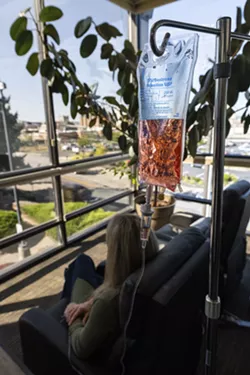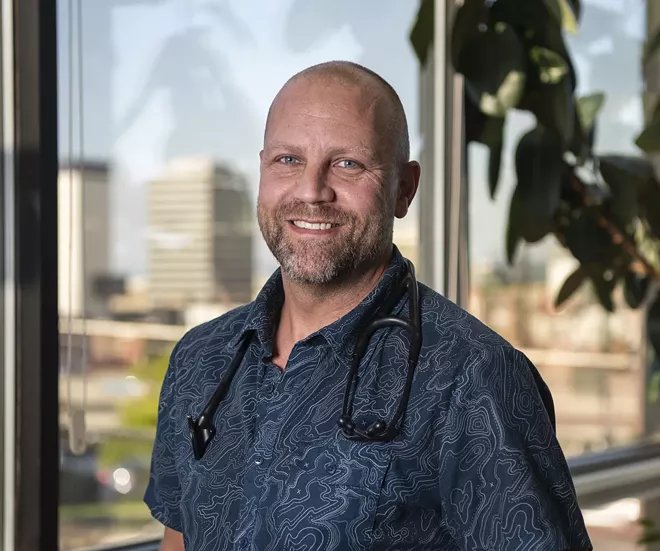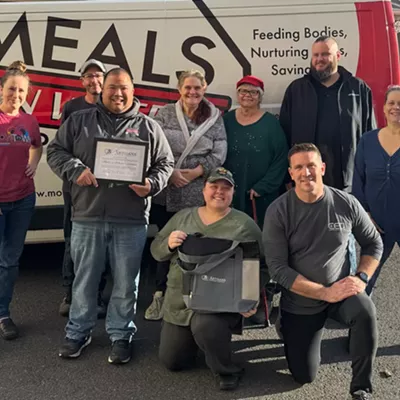Feeling drained? Looking for help with weight loss? At multiple intravenous infusion centers around Spokane, providers suggest the solution to your troubles could be hanging in an IV bag.
Offering concoctions like "The Resurrection," "The Quencher" and "The Glow," IV centers' proponents contend that infusions boost hydration and health by delivering a high dose of vitamins and minerals directly into the bloodstream.
Despite facing scrutiny within the medical community, the treatments have captured the attention of individuals from an array of demographics — from top-level athletes to middle-agers looking for a boost. And providers are standing by with a wide variety of IV blends aimed at targeting a spectrum of concerns such as low energy, sleep difficulties, chronic pain, age-related changes, anxiety, weight management and stress.
SEEKING REJUVENATION
IV therapy is frequently sought to address acute symptoms such as post-workout dehydration, hangovers or just an overload of stress.
Physician assistant and owner of The IV Method Peter Glanville attributes the widespread appeal of the treatment to its convenient and rapid approach to addressing these immediate concerns.
"It's a great way for people to quickly get some of the things they need to help them feel better without having to go through doctors' offices and insurance issues," he says.
At IV centers like The IV Method, clients can simply walk in and receive an infusion after completing a medical history questionnaire and brief consultation with an on-site nurse. As a result, the centers attract an array of people with short-term agendas.
"We get anyone from business professionals coming in for their midday energy boost to athletes stopping by before a big game to moms just looking for an extra pep in their step to keep up with their kids," Glanville says.
SEEKING RESTORATION
Many individuals turn to therapeutic IV services in an effort to counteract what we might call persistent health dissatisfaction. These can be chronic issues that don't rise to a medical situation, but interfere with generally enjoying life.
The Myer's Cocktail is the most frequently received IV blend for this purpose. Named for the late John Myers, a doctor who pioneered therapeutic IV treatment in the 1960s, the blend was initially implemented as a method to treat conditions such as asthma attacks, migraines and fibromyalgia.
Jeanine Smith, a client of Spokane's Prime IV Hydration and Wellness, credits the IV blend with alleviating lingering effects of her two brushes with COVID-19.
Following her initial bout with the virus, Smith says she grappled with respiratory and cardiac issues. Then, during her second encounter in 2022, a full month of fatigue and cognitive fog made her desperate to find a solution.
"I would be up for two hours and be so exhausted that I couldn't even talk. I knew I had to do something," she says.
Smith says she discovered IV therapy through a "post-COVID" Facebook group. After doing her own background research on the treatment, an advertisement for a discounted visit to Spokane's Prime IV prompted her to give it a shot.
"After the first infusion, I noticed a difference like within a week. So the next week I had another one and started feeling even better. I continued to go two times a month and after three months, my fatigue was gone," Smith says.
Since then, she has continued to visit the IV center once a month for maintenance.
Restorative IV therapy is aimed at treating the whole person, rather than focusing on a particular organ or symptom.
"It's a complex medical care for patients who are unable to find answers from the traditional medical system," says Jeff Rosenberg, an osteopathic physician who previously worked in emergency medicine and now owns Spokane's Prime IV with his wife. They also represent Prime IV Hydration and Wellness franchises in the state of Washington.
Smith says the improvement in her health has been dramatic. "There's nothing that I've done that's helped as much," she said.
SEEKING RESOLUTION
Some IV clients have a particular goal in mind, such as remedying a vitamin deficiency or losing weight.
In addition to a poor diet, various medical conditions and chronic diseases can impair the body's ability to acquire essential nutrients. Vitamin deficiencies can cause a range of symptoms, though the specific symptoms depend on which vitamin or vitamins are at low levels, as each plays a different role in the body. Testing for vitamin deficiency can either be done by a doctor or sometimes through simply ordering an at-home test.
Should the results indicate a deficiency, IV therapy could serve as an alternative to dietary supplements for replenishment. Glanville says IVs may offer an advantage over oral consumption as IV infusions bypass the body's oral absorption mechanisms. As a result, he says the vitamin enters the body at its full potency and more quickly than when it's consumed in a food or pill.
And then there are IV concoctions claiming to help people lose weight. Prime IV's "The Skinny Drip" contains the standard vitamins and hydrating fluids but also something called lipotropics. According to Rosenberg, lipotropics assist the body in natural fat breakdown and accelerate calorie burning. He emphasizes, however, this IV drip should be thought of as an adjunct treatment.
"It's not a magic cure-all. Rather, it's most effective when combined with healthy eating and regular exercise," Rosenberg says.
THE EXPERIENCE
No matter the outcome a client is seeking, every session of IV therapy offers the same general sequence of events. The procedure is as simple as a blood draw, Glanville says. First, after numbing the area, a needle is used to place a thin plastic catheter directly into the vein. The needle is then removed, and the catheter remains in place to deliver the IV infusion.But to sweeten the experience of an ouchy poke in the arm and also enhance the time spent on the drip, many IV centers are designed with a spa-like ambiance and offer a range of amenities to elevate the overall infusion experience. Rosenberg says Prime IV provides a massage chair and blanket for clients.
"We call it a one-hour vacation," he says.
Glanville agrees, while also placing emphasis on fostering a sense of community at The Method IV. He says that, along with private rooms, the center features a large area furnished with multiple chairs arranged to face each other.
"What we find is that a lot of patients come in and find incredible amounts of support from the other patients in the room. They build a community of wellness within themselves," Glanville says.
A typical appointment ranges from 30 to 60 minutes and usually costs between $100 and $300.
The most common ingredients in IV blends are B complex vitamins and vitamin C. Vitamin C is an antioxidant that helps to maintain muscles and bones and offers immune support. B complex vitamins perform a range of vital functions including cardiovascular support, helping the body convert food into energy and boosting immune function.
Other common add-ins are glutathione and biotin. Glutathione plays a role in preventing cellular damage by binding with toxins and facilitating their removal from the body. Biotin, also known as vitamin B7, is a common addition to beauty supplements, as it is associated with improving the strength, appearance and overall health of the skin, hair and nails.
Fortunately, according to Lingtak-Neander Chan, a professor at the University of Washington School of Pharmacy, there is minimal risk of overdosing on these substances.
"Our bodies only need vitamin supplementation in trace amounts. Water-soluble vitamins like vitamin C and B complex vitamins are unable to be stored in our bodies and even slight excesses will come out in our urine," he says.
CONCERNS

In addition to the prospect of components of an expensive IV being dispatched down the toilet, Chan says IVs, like most medical procedures, do carry some risks. Each instance of accessing the vein carries the potential for introducing infection or inflammation. So it's imperative that those administering the infusion are trained and certified. Both Glanville and Rosenberg say that their registered nurses undergo thorough training and receive regular updates on safe practices.
Chan also emphasizes that despite the staff's experience, these centers are not certified medical clinics, which gives rise to several additional concerns.
First, there's the question of where the products these IV centers use come from. Depending on the source, Chan says, the substances may not be approved by the Food and Drug Administration. According to their respective owners, The Method IV and Prime IV exclusively use FDA-approved ingredients, sourced from various local pharmacies.
Another issue revolves around the competition for these supplies. Chan notes that numerous vitamins and IV fluids are frequently subject to national shortages. If IV centers remain open during these times, they may be vying with hospitals for access to the substances.
"It becomes an ethical question of if these spa-like treatments should be taking products away from hospital patients who need them to sustain life," he says.
Finally, while the individual ingredients in the IV blends may be FDA-approved, no IV blend itself has been, meaning there is no clinically validated study confirming that elective IV therapy is beneficial.
According to Chan, people likely report feeling better due to the rapid hydration their body experiences from the fluid intake, alongside a potential placebo effect. He suggests that visiting one's primary care physician can be a better route to assessing and treating a health issue.
"I would not recommend IV therapy at all," he says. "There should be clear medical needs for individuals receiving these products."
However, for individuals like Smith who weren't satisfied within the realm of primary care medicine, IV therapy can be appealing because it offers the hope of feeling better.
As both the numbers of people with chronic illnesses and the related medical costs continue to rise, Glanville believes more and more people will look to alternative and preventive healing modalities.
"We live in a time where people want to feel better faster, and IV therapies are the fastest way to receive hydration and absorb nutrients," he says.
Rosenberg is also optimistic about the emerging world of elective IV treatments. "It's an exciting new business. We're going to continue to grow, treat more people and hopefully help."





















